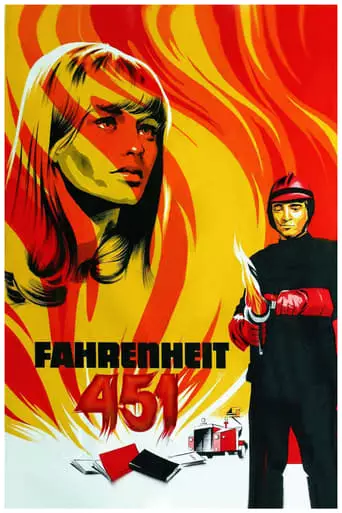
Fahrenheit 451 (1966) Watch Online Free
In the future, the government maintains control of public opinion by outlawing literature and maintaining a group of enforcers, known as “firemen,” to perform the necessary book burnings. Fireman Montag begins to question the morality of his vocation…
Fahrenheit 451 (1966), directed by François Truffaut, is a dystopian science fiction film based on Ray Bradbury’s novel of the same name. The film is set in a future society where books are banned, and firemen are tasked with burning any that are found. The protagonist, Guy Montag (played by Oskar Werner), is a fireman who initially embraces his role in this oppressive society. However, after meeting Clarisse (Julie Christie), a free-spirited woman who challenges his views, Montag begins to question his beliefs and the purpose of his work.
Montag’s transformation begins when he steals a book that he was supposed to burn. This act of rebellion sparks a journey of self-discovery, where Montag becomes increasingly disillusioned with the society around him. He learns about the power of books and ideas, which are suppressed to maintain conformity and control. His internal conflict leads to a showdown with his superior, Captain Beatty (Cyril Cusack), who defends the status quo of censorship and mindless entertainment.
Themes and Analysis: The film explores several profound themes, primarily focusing on censorship, the suppression of knowledge, and the dangers of a conformist society. Bradbury’s original novel critiques the way media and technology can be used to pacify and control the masses. In the film, television serves as a tool of distraction, with people like Montag’s wife, Linda (also played by Julie Christie), becoming obsessed with the endless stream of superficial content.
Another critical theme is the loss of individuality. The society in Fahrenheit 451 is obsessed with sameness, and any form of intellectual curiosity is considered dangerous. The firemen, including Montag, burn books to prevent any differing ideas from taking root. The film critiques the growing tendency toward conformity and the dangers of an overly controlled, technologically dependent world.
The film’s visual style, influenced by Truffaut’s direction, emphasizes the sterile, oppressive nature of this future society. The firemen’s red fire trucks, which appear almost like toys, symbolize the infantilization of society, while the striking scenes of books burning evoke a sense of profound loss and destruction.
Impact of the Movie: Fahrenheit 451 is a thought-provoking film that continues to resonate with audiences, especially in the context of contemporary concerns about censorship, surveillance, and the overreliance on technology. The film’s portrayal of a world where books are destroyed for the sake of social harmony is a chilling reminder of the importance of intellectual freedom and critical thinking.
The film’s emphasis on the power of books and knowledge serves as a timeless commentary on the dangers of intellectual suppression. It challenges viewers to reflect on their relationship with information, technology, and the role of media in shaping public opinion. The film remains a cautionary tale about the consequences of mindless conformity and the erosion of individual thought.
After watching Fahrenheit 451, you will likely feel a mixture of unease and contemplation. The film’s portrayal of a world where knowledge is suppressed and individuality is stifled may leave you questioning the role of technology and media in your own life. The emotional weight of Montag’s journey from blind conformity to self-awareness is deeply moving and may inspire you to reflect on your personal relationship with books, knowledge, and freedom of expression.
The film’s visual imagery, especially the scenes of burning books, will stay with you, evoking a sense of loss and the importance of preserving intellectual freedom. You may feel a renewed appreciation for the power of ideas and the need to protect them in the face of societal pressures. Ultimately, Fahrenheit 451 is a film that challenges viewers to think critically about the world around them and their place within it.
In summary, Fahrenheit 451 is a powerful film that combines engaging storytelling with profound social commentary. It is a must-watch for anyone interested in the intersection of technology, freedom, and the human spirit.
